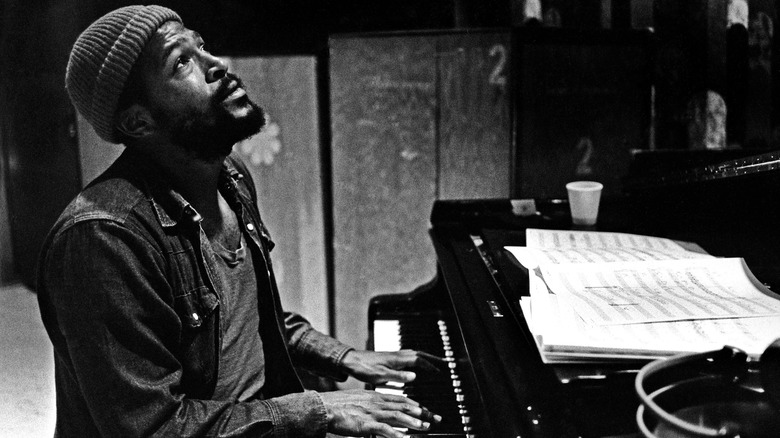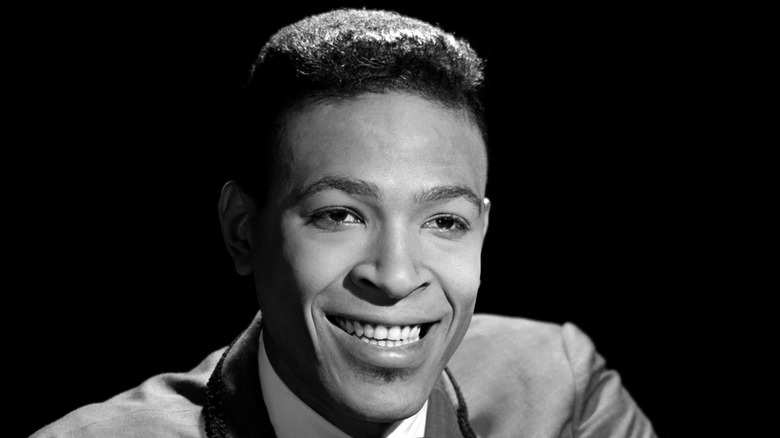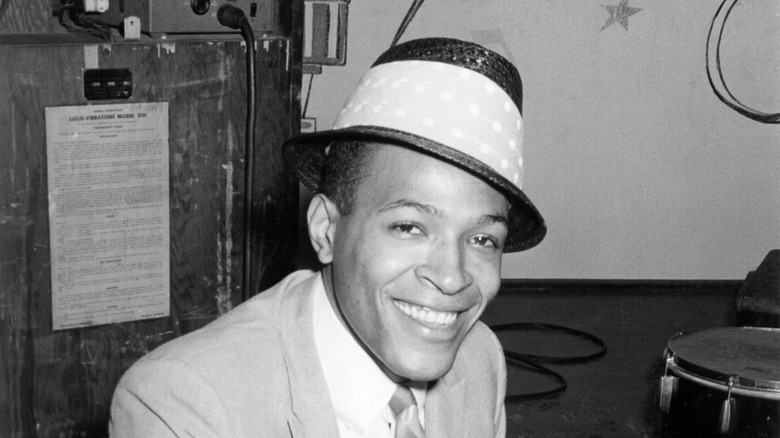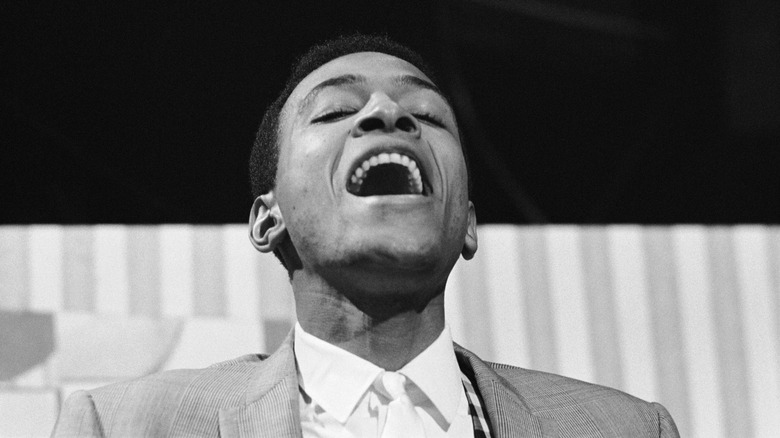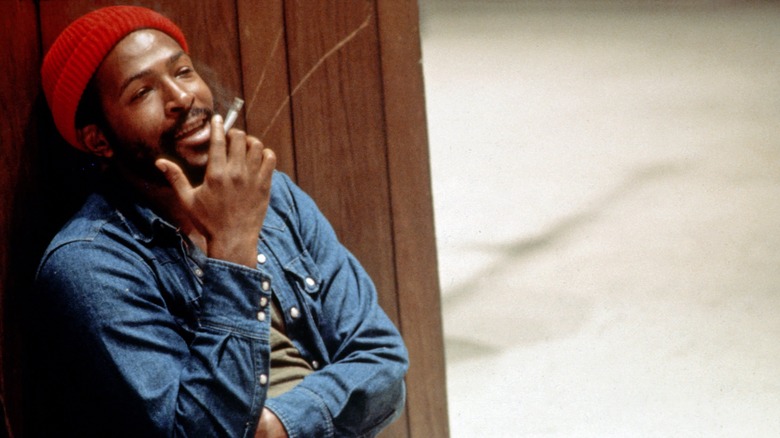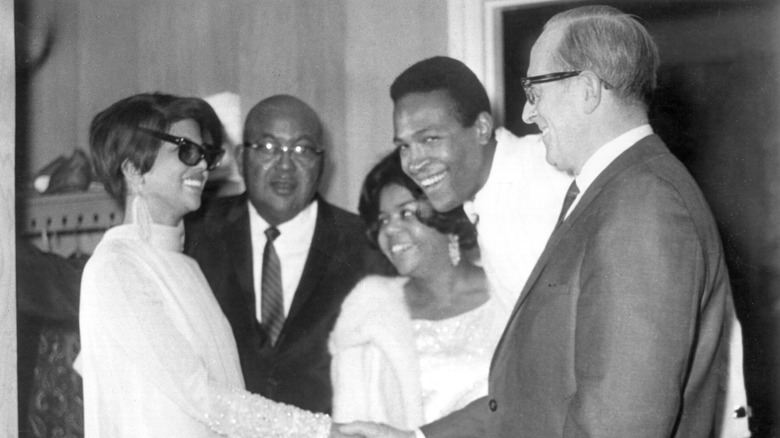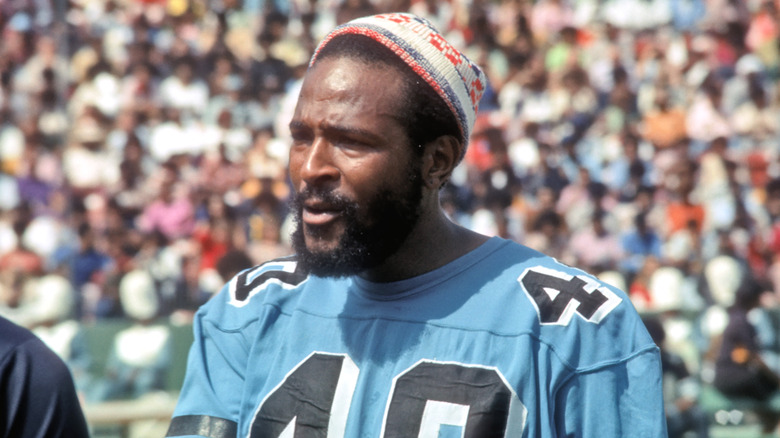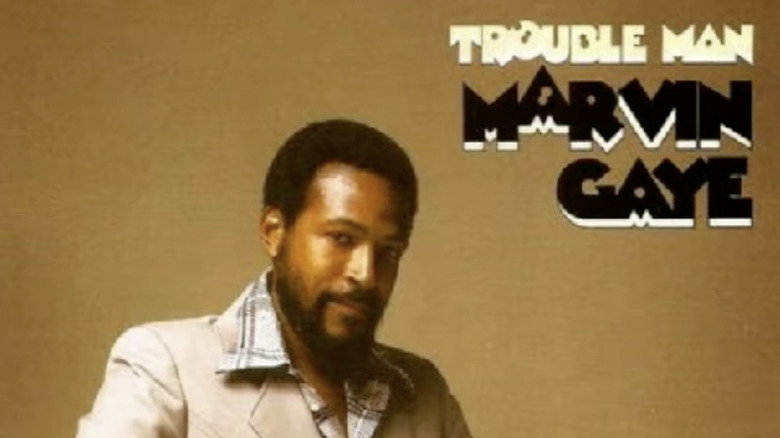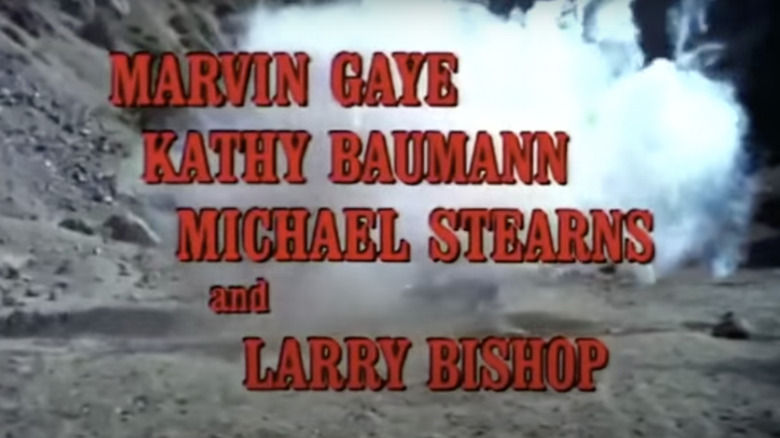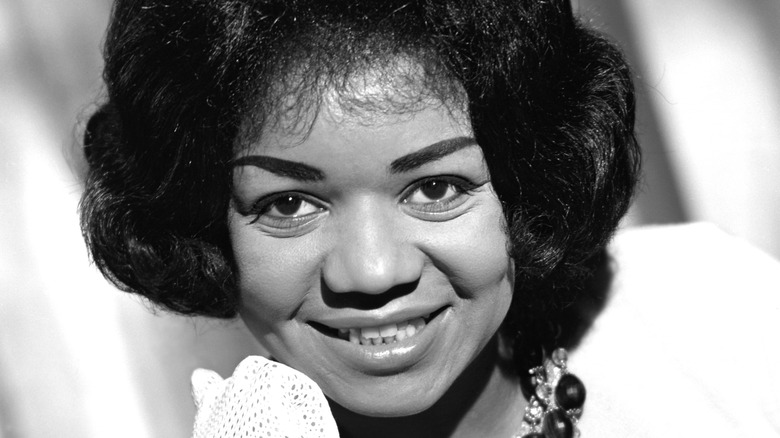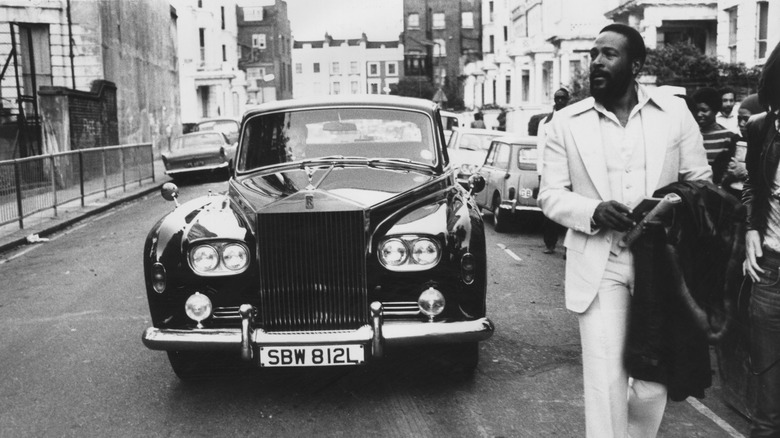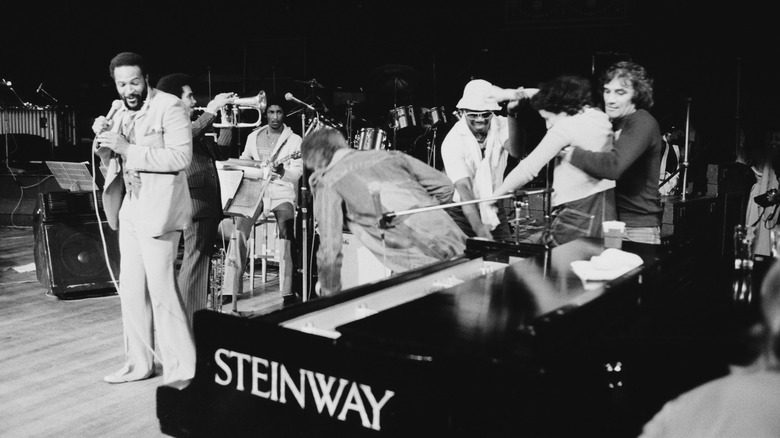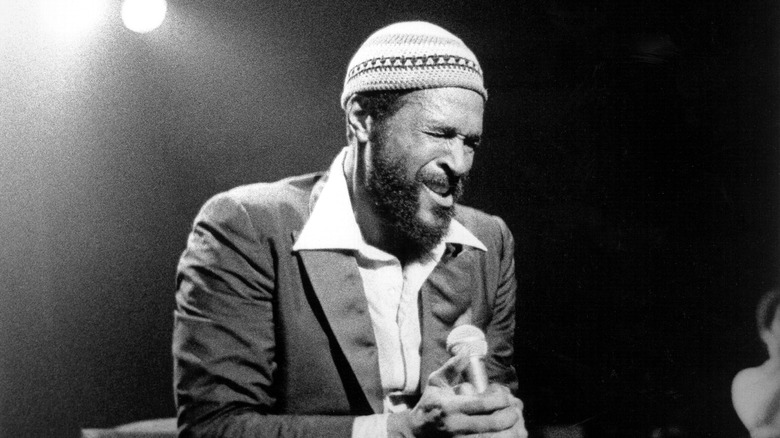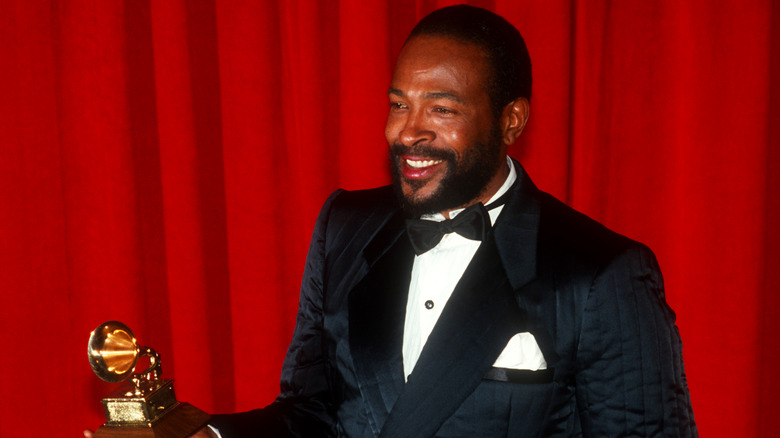The Untold Truth Of Marvin Gaye
When one thinks of soul, the chances of Marvin Gaye's name coming to the tip of the tongue are good. Whether it was his hit duets with Tammi Terrell, the politically-charged album "What's Going On," or the oozing sexuality of his only Grammy-winning song "Sexual Healing," Gaye became a household name within the American musical landscape. His legacy has only grown more significant since his murder in 1984. David Ritz in his 1991 revised edition of his Marvin Gaye biography, "Divided Soul," noted the importance of Gaye's music more pointedly: "Marvin's name has been mentioned — in reverential tones — on no less than seven top-ten hit records. As time goes by, the long list grows longer."
Like many soul singers of his generation, Gaye came from humble beginnings. He was born in Washington, D.C., on April 2, 1939, to local House of God reverend Marvin Gay Sr. and Alberta Gay and started singing in church from the age of 3. His father abused and controlled Gaye throughout his life, culminating in his father murdering him the day before his 45th birthday. Yet in those nearly 45 years of life, Gaye went from desiring to sing standards to shaping the sound of Motown to becoming an icon and creative genius demanding full creative control of his music — which led the way for others like Stevie Wonder. However, he remained caught between the sacred and profane dichotomies within his life and faith and found himself deeply troubled throughout his life (via AllMusic).
Marvin Gaye grew up in 'Simple City'
Marvin Gaye grew up in the Southwest neighborhood of Washington D.C. Frankie Gaye, Marvin's brother, called it "the lowest slum in all of Washington, D.C." in his biography of his brother. Photographer Godfrey Frankel took pictures of the community, talked to its inhabitants, and shared a description that probably would have matched Gaye's experience. He is quoted in the DCist, saying, "Residents of Southwest ... were often called 'alley rats' by outsiders. At the time, nearly 10,000 people called these alleys home ... Dwellings faced alleys, as opposed to tree-lined streets with sidewalks, and were typically two stories high, dark, cramped, and built from wood or brick. Most had no electricity, central heating, or indoor plumbing. Wood stoves and outhouses were a common sight."
The general perspective on the neighborhood at the time by surrounding (wealthier) residents was one of disgust and fear — "They radiate out insanitary influences" (via a 2018 Public Health Report) — which explains why Gaye, his friends, and the rest of the Southwest community probably felt like they were from another country. Yet it would be Gaye himself who, along with his friends, would call the neighborhood "Simple City." He described it as "half city, half country" and not a normal neighborhood situation (via "Divided Soul").
He said he might have committed suicide as a child
Marvin Gay Sr. was a violent man, and his wife and children, including Marvin Gaye, lived in fear of his punishments and the inevitable religious reasoning behind his domestic abuse (via The Vintage News). Gaye talked about how everyone had to navigate his constantly shifting moods and would have to do anything and everything to win his favor. Gaye, however, from an early age defied him and hated his attitude, even though all he really wanted was his father's love. He describes his father further in David Ritz's "Divided Soul": "Living with Father was something like living with a king ... a very peculiar, changeable, cruel, and all-powerful king."
He sang in order to please his father, but the better he got, the more demands were placed on him. Ritz's biography only gets darker as Gaye talks about where this eventually led him: to suicidal thoughts. The only thing that stood in the way of him and death was, according to Gaye himself, his mother, Alberta, who constantly loved him and praised his singing. If it hadn't been for her, he said, "I think I would have been one of those child suicide cases you read about in the newspapers" (via "Divided Soul"). Maybe it would come as no surprise then that one of Marvin's close friends, Dave Simmons, considered his murder at the hands of Marvin Gay Sr. to have been an act of suicide (via "Marvin Gaye, My Brother").
If you or someone you know is dealing with domestic abuse, you can call the National Domestic Violence Hotline at 1−800−799−7233. You can also find more information, resources, and support at their website.
If you or anyone you know is having suicidal thoughts, please call the National Suicide Prevention Lifeline at 1-800-273-TALK (8255).
He faked mental illness to get out of the Air Force
In order to escape a nasty home life, Marvin Gaye enlisted with the Air Force with visions of being a pilot like Errol Flynn, even though he was terrified of flying. Really, it came down to another act of defiance towards his father. "I was sick to death of my Father's household. I had to get out. Besides I didn't have the concentration to make it through high school. I was afraid of failing. I knew I couldn't live up to Father's standards." Yet he would find that while he was in the military, his romantic idealization of it would come crumbling down. He wasn't able to adjust to the extreme regimentation of military life, and he was openly oppositional to authority. Gaye said of his time in the military, "I felt betrayed ... I went in to learn how to fly and wound up peeling potatoes on some God-forsaken bases in Kansas, Texas, and Wyoming" (via "Divided Soul").
He described what he ended up doing to earn his honorable discharge from the military in "Divided Soul." He had finally had enough of his time in the Air Force, so he began to act crazy in order to convince them that he had some form of mental illness. However, as Gaye states, "In the end, believe me, it was no act. My discharge was honorable though it plain stated 'Marvin Gay cannot adjust to regimentation and authority.'"
He added an 'e' to his last name due to questions of sexuality
There are a couple of stories about how Marvin Gay Jr. became Marvin Gaye with that extra "e" at the end. One such story has it that on the release of his first Motown single, "Let Your Conscience Be Your Guide," the record company added the "e" to his last name (via Detroit Historical Society). However, in most accounts of this minor change of names, the person making the decision was Gaye himself, once again stemming from his complicated relationship with his father.
Gaye talks about his name in "Divided Soul" and how he was deeply troubled by having the same name as his father, who is often described as a "sexually ambiguous man." All it took for Gaye to be reminded of this connection was for people to add "is" to the front of his name, asking "Is Marvin Gaye?" He just couldn't escape the teasing and the confusion of his own sexual identity. Beans Bowles, a music producer who knew Gaye, stated, "He fought it ... The cats would kid him about being gay, knowing he wasn't, but knowing how he hated hearing about it. We called him Gayesky. That bugged him too." Ritz himself added to this section of Gaye's life that he was attached to his father, "branded for life."
Marvin Gaye believed he cursed his duet partners
Throughout his Motown career, Marvin Gaye had several duet partners. His first partner in 1964 was Mary Wells — at the time, the "queen of Motown" — but their duet record, "Together," tamed her sound while it gave Gaye a platform to shine. She left Motown. Gaye was then placed with Kim Weston, and their song "It Takes Two" became a massive hit, but after that record, she, too, left Motown (via The New Yorker). Then came the forgotten Oma Heard (often mistaken on records as Oma Page) who was experienced in the record industry by the time she recorded some duet sides with Gaye. For all of the singles she recorded for Motown at the time, all but one of the singles was unreleased (via Discogs). The New Yorker then relays his most successful partnership with Tammi Terrell, which started in 1966 and led to numerous hits, but Terrell died from a brain tumor in 1970.
It wasn't until 1973 when Barry Gordy tried to convince Gaye to do a duet record with Diana Ross that Gaye revealed his feelings about having another duet partner. The Los Angeles Public Library reports, "Gaye was reluctant; he had come to think that his partners were cursed. Wells and Weston had both left Motown after their duet albums with Gaye, and neither had much of a career after leaving; and Terrell's death still weighed heavily on Gaye."
He attempted to try out as wide receiver for the Detroit Lions
Marvin Gaye had found himself in a deep depression by 1970. It would be at this time that he would befriend two seemingly unlikely men in Lem Barney and Mel Farr, both players for the Detroit Lions. ESPN contextualizes this moment in Gaye's life by pointing out that Tammi Terrell's death happened just a couple of years after the assassinations of Malcolm X, Martin Luther King, Jr., and Robert Kennedy. The Watts Riots, the continuation of the Vietnam War, and the Kent State shootings had also just shaken both the American public and Gaye himself. "In my heart, I could no longer pretend to sing love songs for people. I couldn't perform. When Tammi became ill, I refused to sing in public" (via "Divided Soul").
Gaye got the idea that he wanted to try out as a wide receiver for the Detroit Lions. "I'd rather catch a pass and score a touchdown in Tiger Stadium, than rack up another gold record" (via "Marvin Gaye, My Brother"). He trained with Barney and Farrar, bulked up 30 pounds, and stayed off cocaine in order to be taken seriously. Joe Schmidt, Detroit's coach, gave Marvin an invite to a practice and had him run some routes and found him to be ... just decent. "Gaye didn't receive a training camp invite. His tryout was the end of the fantasy. He would go back to a recording studio and watch Farr and Barney ply their trade on Sundays" (via ESPN).
He wrote and produced a blaxploitation soundtrack with new technology
Everyone knows the classic "What's Going On," but not many realized that the project that would follow that hit album would be the soundtrack for a blaxploitation film called "Trouble Man." It would also end up being one of the projects Marvin Gaye would be most proud of in his career. He told David Ritz in "Divided Soul" that "this is probably my favorite work ... It had never been this intense before." He had wanted to make a jazz record with fewer vocals, and the soundtrack from "Trouble Man" became just that.
Gaye and the producers and musicians he worked with on the soundtrack found themselves experimenting with new technology. The first mini Moog synthesizer had been created eight years before the release of the soundtrack by Bob Moog at the behest of composer Herb Deutsch (via Moog Music). While electronic music had been creating experimental soundscapes before the soundtrack, it was a rare technology to be found in the halls of Motown. They also found a way to create a drum loop for the record. Trevor Lawrence, the saxophonist on the record, told Celeste Headlee on NPR, "Now back in '72 there were no samplers. What they did was they took a piece of tape and they had the two track tape machine, and they made that pattern that made a loop like a figure eight around the tip – rim, which I'd never seen before."
Marvin Gaye starred as a Vietnam vet in two films
While Marvin Gaye would be mostly known for creating the music behind the film, "Trouble Man," he did try his hand at being in front of the camera as well. In 1969 and 1971, Gaye would have small roles in two relatively forgotten films, "The Ballad of Andy Crocker" and "Chrome and Hot Leather," respectively. Voices of East Anglia stated about Gaye's transition to acting in these films: "He was good looking, had the voice of an angel and was a big draw. An acting career beckoned, and ambitious Marvin had aspirations to make it on the big screen following in the footsteps of Elvis Presley and Frank Sinatra."
Coming up on the final years of the Vietnam War, both films featured Gaye playing Vietnam War vets. "The Ballad of Andy Crocker" was "one of the first films to look at the effect of the Vietnam War on the veterans who returned home." While "Chrome and Hot Leather" offered a different take on a similar theme as it tells the story of a group of Green Berets who take vengeance on a biker gang.
He had a child with a 15-year-old girl
During Marvin Gaye's first marriage to Anna Gordy, sister of Berry Gordy Jr. — the founder of Motown Records — they adopted a boy from her niece, Denise Gordy, who was only 16 at the time of the birth. However, Michael Eric Dyson revealed in his book, "Mercy, Mercy Me: The Art, Loves & Demons of Marvin Gaye" that the child was actually Gaye's biological son, and he had, with much parallel to the Biblical story of Abraham and Sarah, had intercourse with the 15-year-old Denise in order to have a son, since his wife couldn't get pregnant.
It made sense that Gaye never admitted to being the father — not even to David Ritz in "Divided Soul" — because, according to Dyson, "Marvin had made love to a minor, apparently with the consent of all involved. Still Denise was under the age of legal consent and Marvin might have gone to jail for statutory rape."
He relocated to Europe twice to avoid paying back taxes
When Marvin Gaye divorced Anna Gordy in 1977 and subsequently separated from second wife, Janis Hunter – who was 17 when they met and fell in love – in 1979, his financial issues began to encroach into his existence to the point that he could no longer ignore it. He absconded to London first, but he realized that London was a little too fast-paced for him, stating, "Not having lived there before ... I wasn't sure what to expect. But as far as drugs and women go, London's as wild as any city needs to be. I had access to anything I wanted, and that was part of the problem" (via "Divided Soul"). From London, "he was rescued by Belgian businessman Freddy Cousaert, who got Marvin back on his feet ... It was while he was in Belgium that Gaye produced the last big hit of his career, 1983's 'Sexual Healing'" (via "Mercy, Mercy Me").
After Gaye's death, the sum total of what he owed to the IRS, creditors, and in alimony was discovered. He owed the IRS over a million dollars, the state of California around $600,000, and alimony to both Gordy and Hunter totaling more than $300,000. An unnamed woman was also suing him for being beaten by him at the end of '82 to beginning of '83, as reported by David Ritz in "Divided Soul."
Motown acquired and released Marvin Gaye's album without consent
Motown caused the final rupture in their relationship with Marvin Gaye when they released his 16th studio album, "In Our Lifetime," without Gaye's consent. They had made changes to the production of the album which angered Gaye significantly, as did changing the very title from "In Our Lifetime?" to "In Our Lifetime." The question mark put him over the edge when he stated to David Ritz, "They left out the question mark. That was the whole point. The question was, 'Is the world coming to an end in our lifetime?'" (via "Divided Soul"). The song "Far Cry" — which was released on the record — wasn't even finished according to Gaye. Motown added instrumentation to it, and Gaye railed against them, "How dare they second guess my artistic decisions!" (via "Divided Soul").
According to David Ritz's "Divided Soul," Gaye thought that Motown had gotten their hands on the unfinished masters from a couple of the musicians who had snuck them out of London and brought them to Los Angeles. Nonetheless, it didn't matter because the record was out and shipped all around the world whether Gaye wanted it to be or not.
Marvin Gaye (like his father) would wear women's clothing
From an early age, Marvin Gaye was kidded by his peers for his father's looks, ambiguous sexuality, effeminacy, and the poorly kept secret that he would dress in women's clothing. "I wanted to smash their faces and cut their throats, but I was afraid ... that I was too much of a woman to fight back." When David Ritz talked to Gaye about his father and his own confused feelings of sexuality, he noted that he, himself, was intrigued by women's clothing. "In my case, that has nothing to do with any attraction for men. Sexually men don't interest me. But seeing myself as a woman is something that intrigues me. It's also something I fear."
He goes on to state that in rare moments of extreme privacy, he would indulge that fascination; then, he would live with the shame and guilt of the action for weeks after (via "Divided Soul"). That shame is something that would haunt him throughout his life, and it was something he carried because of his complicated relationship with his father.
The gun he gave to his father was used to kill him
It has been fairly widely known that Marvin Gaye was killed by his father in 1984, but what may not have been as widely known is that the .38 caliber revolver that Marvin Gay Sr. used to shoot his son had been a gift from his son four months earlier. Marvin Sr. had said that having several guns in the house made him feel safe, according to Gaye's mother, Alberta. Gaye had intervened in an argument between his mother and father that night and paid the ultimate price, one almost seemingly determined by fate knowing how ever-present the threat of his father had been throughout his life (via "Divided Soul").
Michael Eric Dyson pushed forward the argument that Gaye sought out his father's anger in order to end his own life. According to a review of "Mercy, Mercy Me" by The Washington Post, Dyson proposed "that [Gaye] was attempting a form of passive-aggressive revenge by hanging his own death on his father's conscience." On November 2, 1984, the judge sentenced Marvin Gay Sr. to five years of probation without jail time because he had been persuaded by the argument that Gaye had attacked his father twice. The shooting had been in self-defense (via "Divided Soul"). In the immediacy of the moment, this might have made sense, but knowing the history of Gaye's relationship with his father in hindsight, it might have had a different verdict.
